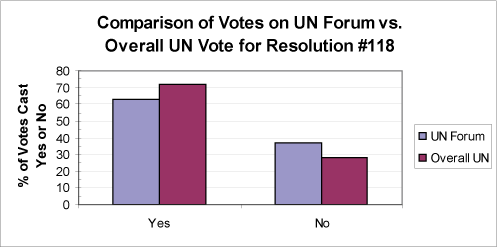Difference between revisions of "The Sex Education Act"
Mikitivity (Talk | contribs) m (Centering Text) |
Mikitivity (Talk | contribs) m |
||
| Line 60: | Line 60: | ||
Nations participating in the UN forum debates were asked to disclose their vote: yes, no, or abstain as part of an official survey. The raw UN forum poll results of this survey are presented above. On the UN forum, XX nations voted for the resolution, XX against, and 15 nations abstained. The abstentions are not included in calculating the percentage of votes. | Nations participating in the UN forum debates were asked to disclose their vote: yes, no, or abstain as part of an official survey. The raw UN forum poll results of this survey are presented above. On the UN forum, XX nations voted for the resolution, XX against, and 15 nations abstained. The abstentions are not included in calculating the percentage of votes. | ||
| − | The final overall UN ("official") vote was XX% of the votes cast being in favour, while the UN forum vote was XX% of the votes cast (for or against) being in favour. In this particular case it appears that the UN forum debate and poll were poorly representative (within 10%) of the entire UN vote. | + | The final overall UN ("official") vote was XX% of the votes cast being in favour, while the UN forum vote was XX% of the votes cast (for or against) being in favour. In this particular case it appears that the UN forum debate and poll were poorly representative (within 10%) of the entire UN vote. However, like other comparisons between the UN forum and overall UN vote, the trend in this survey was that the UN forum is much less likely to support a resolution than the overall UN. |
Revision as of 12:13, 28 August 2005
Contents
Resolution History
Overview
Proposal Campaign
UN Debate
Resolution Text
| Category: | Human Rights | Strength: | Mild | Proposed By: | Love and esterel |
|---|
The United Nations,
DEEPLY DISTURBED that in many Nations:
-A- Sexual education is lacking
-B- Education about female sexuality is often unheard of and no mention is made of the clitoris, the statistically most erogenous zone for women, which is not directly correlated with reproduction
-C- Lack of quality sex education can lead, many times, to unplanned teen pregnancies and unnecessary abortion
OBSERVING that:
-D- Sex has two important functions: reproduction and pleasure
-E- Sexual activity is a common activity, contributing to the happiness of many people, worldwide
URGES:
-1- All Nations to organize and secure some sexual education courses for all, before the age of 18-years; and
-2- All Nations to include in these courses, information about male sexuality, female sexuality, opposite-sex relationships, same-sex relationships, masturbation, birth control methods, abortion right, AIDS and sexually transmitted diseases without any value judgment
Gameplay Impacts
This resolution had no significant impacts on changing the way NationStates is played. However, like several previous resolutions, a poll asking nations if they voted yes, no, or abstained was attached to the official resolution debate. With XXX responses by the time debate had closed it is possible to compare the results of the UN forum poll to the official vote totals to address the question: "How representative is the UN forum of UN votes?"
Nations participating in the UN forum debates were asked to disclose their vote: yes, no, or abstain as part of an official survey. The raw UN forum poll results of this survey are presented above. On the UN forum, XX nations voted for the resolution, XX against, and 15 nations abstained. The abstentions are not included in calculating the percentage of votes.
The final overall UN ("official") vote was XX% of the votes cast being in favour, while the UN forum vote was XX% of the votes cast (for or against) being in favour. In this particular case it appears that the UN forum debate and poll were poorly representative (within 10%) of the entire UN vote. However, like other comparisons between the UN forum and overall UN vote, the trend in this survey was that the UN forum is much less likely to support a resolution than the overall UN.
Additional Materials
- The Sex Education Act UN Floor Debate
- Draft proposal: the Sex Education Act Draft Proposal Discussions
- UN Timeline
- United Nations

